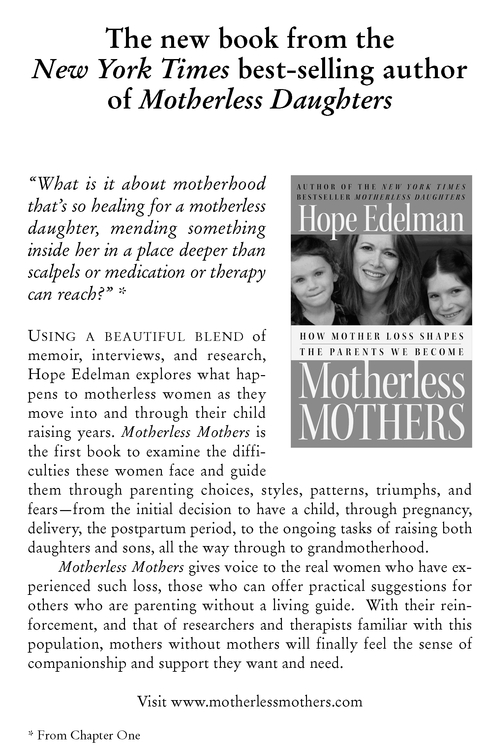Motherless Daughters (58 page)
Read Motherless Daughters Online
Authors: Hope Edelman

threat of, and fathers
See also Abandonment
Relationships. See Love (looking for); Mother-daughter relationships; Mother loss (and relationships); other specific topics
Reorientation
Resentment
in adolescence
and birth order
and illness
and mourning
and siblings
toward fathers
Revenge
Rich, Adrienne
Robbins, Martha A.
Roosevelt, Eleanor
Roth, Geneen
Rothenberg, Rose-Emily
Rowell, Victoria
Russell, Colleen
Ryan, Meg
Ryder, Robert G.
Sadness
and abandonment
and adults
and anger
and children and adolescents
postpartum
The Second Sex
Secondary loss
Secunda, Victoria
Security
and abandonment
and achievement
and attachments
and close relationships
emotional
and fathers
and gender identity
and mother loss
and siblings
Self-esteem
and abandonment
and adolescents
and cold parental caregivers
and doulas
and fathers or other surviving parent
and female mentor
and mother loss
and relationships
and school experiences
Separation
and later relationships
from mother, as middle-aged adult
from mother, as young adult
from mother, in adolescence
from mother, with motherhood
and oldest child
physical
September 11, 2001, terrorist attacks
Sex See also Love (sex as); Women (with women)
Sexual revolution
Shame
and abandonment
and mother loss
Shoplifting
Shostak, Linda
Siblings
and adult mother loss
and birth order
and comfort, protection, and support
and experiences of mother loss
losses of
as mothers
number raising other siblings
and orphans
percentage of interviewees who have
relations between, and mother loss
step
See also Brothers; Sisters
Silence
in families
and fathers
See also
Fathers (not talking about loss)
See also
Fathers (not talking about loss)
Silverman, Phyllis
Simmons, Ruth
Simpson, Nicole Brown
Sisters
and experiences of mother loss
as mothers
relations between, and mother loss
See also Siblings
Sleeping problems
Smart Girls, Gifted Women
Smiley, Jane
Sontag, Susan
Spock, Benjamin
Stein, Gertrude
Stephen, Julia
Stepmothers
and birth order
“evil,”
and father-daughter relations
and mother substitutes
as new mothers
problems with
and sibling experiences of mother loss
Stowe, Harriet Beecher
Suicide
and anger
and children and adolescents
of daughters
father not talking about it
fear of repeating mother’s
and feelings of rejection and abandonment
and lesbianism
percentage of mother losses by
reactions to
and trust
Support groups
Swander, Mary
Terr, Lenore
Terrorism
Therapy
and abandonment
and compulsions
and early mother loss
of fathers
and idealized mother image
postpartum
Thomas, Dylan
Toman, Walter
Transference
Trust
and fathers
and mother loss
and suicide
Twain, Mark
Twain, Shania
War casualties
Warshak, Richard A.
Wellesley College
When Food Is Love: Exploring the Relationship Between Eating and Intimacy
When Parents Become Partners
When You and Your Mother Can’t Be Friends
Williams, Evelyn
Winfrey, Oprah
Withdrawal
and adolescent mother loss
and adult mother loss
and early mother loss
of fathers
and later relationships
of school-age children
Without You: Children and Young People Growing Up with Loss and Its Effects
Wolfenstein, Martha
Womanhood
and other women
Women
and female life stories
friendships of
movement of
normal losses of
older
with women
Women and Their Fathers
Woolf, Virginia
Worden, J. William
Wordsworth, Dorothy
Zall, Donald

HOPE EDELMAN has a bachelor’s degree in journalism from Northwestern University and a master’s degree in creative nonfiction writing from the University of Iowa. Her articles and essays have appeared in numerous publications, including the
New York Times
, the
Chicago Tribune
, the
San Francisco Chronicle
, the
Washington Post
, the
Dallas Morning News
,
Glamour
,
Child
,
Parenting
,
Seventeen
,
Real Simple
,
Self
, and
The Iowa Review
. She is the recipient of a
New York Times
Notable Book of the Year designation and a Pushcart Prize for creative nonfiction. Currently an associate faculty member in the MFA program at Antioch University-LA, she lives with her husband and their two daughters in Topanga Canyon, California.
New York Times
, the
Chicago Tribune
, the
San Francisco Chronicle
, the
Washington Post
, the
Dallas Morning News
,
Glamour
,
Child
,
Parenting
,
Seventeen
,
Real Simple
,
Self
, and
The Iowa Review
. She is the recipient of a
New York Times
Notable Book of the Year designation and a Pushcart Prize for creative nonfiction. Currently an associate faculty member in the MFA program at Antioch University-LA, she lives with her husband and their two daughters in Topanga Canyon, California.

1
Of the 168 people who died that day, 87 were adult women, although no data exists to show how many of them were mothers.
2
This is driven by steep declines in the death rates of certain cancers, such as breast cancer. The death rate from lung cancer has actually gone up slightly, and the death rate from cancer among African American women has increased as well.
3
More than 532,000 children are currently in the U.S. foster-care system, three-quarters of whom have been placed with nonrelatives. Approximately 126,000 children have mothers who are imprisoned; most of these kids are being raised by grandparents.
4
This is not always true for mothers who never separate or who separate incompletely from their own mothers, and who expect to maintain a similar bond with their daughters.
5
When a daughter is not aware of a mother’s long-term illness, or when the death is unexpected—such as when a mother whose cancer is in remission dies of sudden heart failure—she often responds to the loss as a daughter who has experienced a sudden death.
6
According to U.S. Census data, about 63,000 of these girls were living with widowed fathers. The rest lost mothers to abandonment or divorce. The 840,000 figure, however, doesn’t include girls whose widowed fathers remarried. Approximately 400,000 girls in the United States are currently living with a biological father and a stepmother, although no bureau statistic exists to tell us how many of these girls lost their mothers to death.
7
Of the 154 motherless women surveyed for this book, 28 percent were oldest daughters, 25 percent were middle children, 31 percent were the youngest, 15 percent were only children, and 1 percent were twins.
8
Because the survey asked the open-ended question, “What is your marital status?” the number of women currently married may include some second and third marriages, and the number currently single may include some women who have been divorced. An additional 3 percent of the women surveyed were widowed.
9
Some women named more than one mother substitute.
10
Not one woman chose the answer “nothing.” It seems that even a daughter who spent very little time with her mother manages to collect some information about her or identify with her experiences, and feels she knows something about her life.
11
These were women who had not tested positive for a BRCA gene. Motherless daughters who do test positive often opt for prophylactic mastectomies and reconstructive surgeries, with full support from their doctors.
12
The researchers defined
resolved,
a term I prefer to avoid, by the subjects’ scores on the Lack of Resolution of Mourning Scale, which is based on John Bowlby’s discussion of normal and pathological grief. Researchers also took into account a mother’s behavioral response at the time of loss, as well as her adult preoccupation with thoughts of early attachments.
resolved,
a term I prefer to avoid, by the subjects’ scores on the Lack of Resolution of Mourning Scale, which is based on John Bowlby’s discussion of normal and pathological grief. Researchers also took into account a mother’s behavioral response at the time of loss, as well as her adult preoccupation with thoughts of early attachments.
13
When Charlotte wrote this story, Anne was five—the same age Charlotte was when their mother died. According to Branwen Bailey Pratt, the author of the article “Charlotte Brontë’s ‘There was once a little girl’: The Creative Process,” observing Anne at age five may have reactivated Charlotte’s emotional response to her mother’s death, which caused her to choose this topic for her story.
14
May include women cohabiting with partners
Many of the designations used by manufacturers and sellers to distinguish their products are claimed as trademarks. Where those designations appear in this book and Da Capo Press was aware of a trademark claim, those designations have been printed with initial capital letters.
Quoted material on pages 36 and 49-50 from Erna Furman’s
A Child’s Parent Dies
© 1974 is
A Child’s Parent Dies
© 1974 is
“A Refusal to Mourn the Death, by Fire, of a Child in London” from
The Poems of Dylan Thomas
© 1945 by the Trustees of the Copyrights of Dylan Thomas is
© 1945 by the Trustees of the Copyrights of Dylan Thomas is
All rights reserved. No part of this publication may be reproduced, stored in a retrieval system, or transmitted, in any form or by any means, electronic, mechanical, photocopying, recording, or otherwise, without the prior written permission of the publisher.
Set in 11 pt. Stempel Garamond by Cynthia Young
Library of Congress Cataloging-in-Publication Data
Edelman, Hope.
p. cm.
“First Da Capo Press edition.”
Includes bibliographical references and index.
eISBN : 978-0-738-21132-9
1. Deprivation (Psychology) 2. Loss (Psychology) 3. Maternal deprivation. 4. Mothers and daughters. 5. Bereavement—Psychological aspects. I. Title.
BF575.D35E34 2006
155.9’37--dc22
155.9’37--dc22
2005033840
Da Capo Press books are available at special discounts for bulk purchases in the U.S. by corporations, institutions, and other organizations. For more information, please contact the Special Markets Department at the Perseus Books Group, 11 Cambridge Center, Cambridge, MA 02142, or call (800) 255-1514 or (617) 252-5298, or e-mail [email protected].
/
Other books
The Promise of Love by Billi Jean
Marked in Mexico by Kim McMahill
My Soul to Lose by Rachel Vincent
A Shot in the Dark by Christine D'abo
Empire Falls by Richard Russo
The Unveiling (Work of Art #2) by Ruth Clampett
Only the Dead Live Forever by W. J. Lundy
A Gracious Plenty by Sheri Reynolds
Secret Obsession by Robin Perini
River Road by Suzanne Johnson
